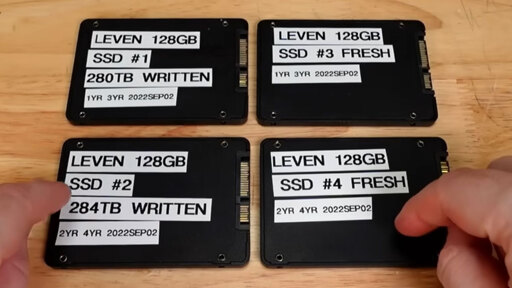Seeing these errors means “the SSD is on its way out,” according to HTWingNut.
Since we’re simply talking about being unpowered for a while, wouldn’t a simple full format fix/reset all ECC errors? No need to scrap the drive.
Surely a cap/transistor temporarily losing charge shouldn’t permanently destroy it!
Anyways, HDD for 6-24 months offline data storage, SSD for always-online data storage, and flash if you’re a masochist like me.
I’m sure USB pen drives are even worse.
I actually just pulled some files off of one from 2004-ish. No issues. Found another one from 2008 about a year ago that had no issues as well. Not sure why… maybe because they were so much lower capacity? Like, one was 64MB and that was huge back then.
They were slc, so the charge ratio was much higher.
Mlc/tlc/qlc drives have to measure a current very precisely, up to 16 values of discrimination, any charge degredation doesn’t change a 1 to a 0, but a 3 to a 2 to a 1 and given enough time, a zero.
Also smaller gate dielectric so more leakage.
Those old drives may be using SLC flash. It can have a 20+ year data retention.
I pulled some data off some old Samsung 1TB SSDs that werent powered for 3-4 years without an issue either. I guess they were SLC based on what others are saying.
I guess it’s a your mileage may vary situation depending on the exact drive you purchase and probably other factors too.
The four tested ‘Leven JS-600’ branded SSDs are basically bog-standard no-name units.
Oh.
Bog standard? They are more like “god knows what’s inside these” and cionsidering I have a solid suspicion there is no god…
There is a fairly reasonable theory floating around that no name drives have B quality chips, so these may have started with chips that were iffy from the start. Id like to see a test of this type , carried out by Backblaze, with thousands of drives.




